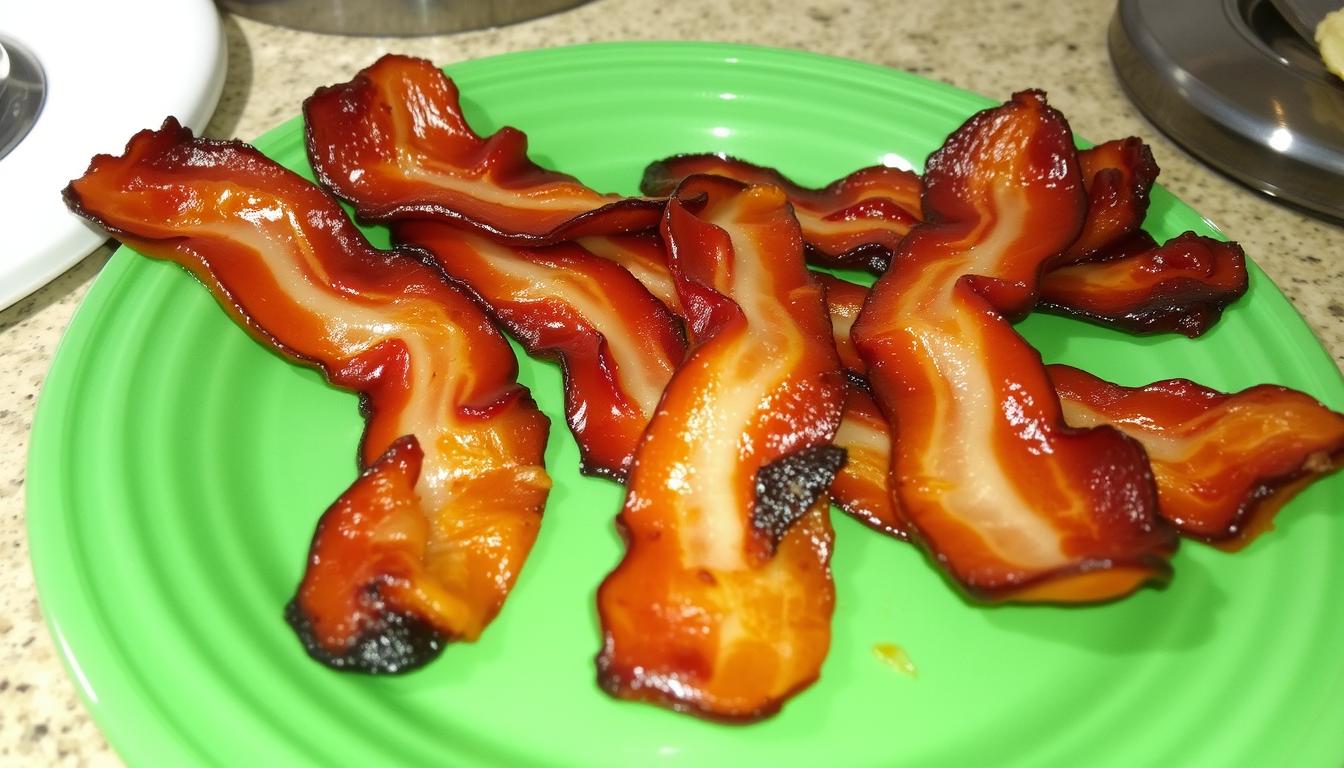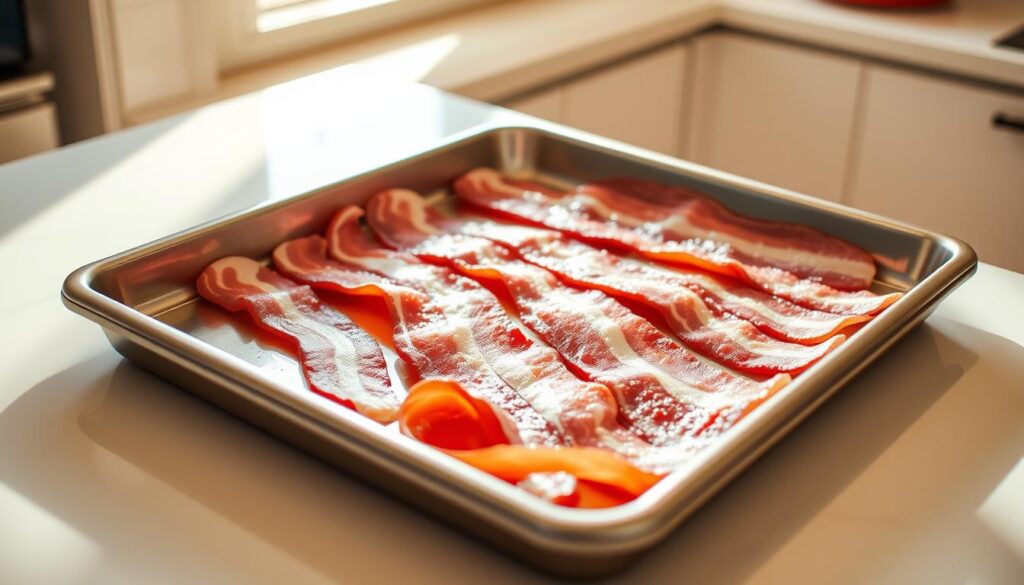Getting delicious, crispy bacon is now super easy with oven baking. Forget the mess of stovetop cooking. Oven-baked bacon gives you perfect strips every time, without any splatters. It’s perfect for big groups or meal prep, making it the best way to cook bacon without a fuss.
Oven-baked bacon has many advantages. It ensures consistent results and saves time and energy. With just a few steps, you can get the crispy bacon you love, all in your oven.
Key Takeaways
- Oven-baked bacon is easy, mess-free, and delivers consistently crispy results
- Cooking bacon in the oven is a hands-off method that’s perfect for meal prep or feeding a crowd
- Oven-baked bacon requires minimal cleanup compared to stovetop cooking
- This method allows you to cook larger batches of bacon at once
- Oven-baked bacon is a time and energy-efficient way to prepare this beloved breakfast staple
Why Choose Oven-Baked Bacon
The oven is a great tool for cooking bacon. It makes the process easy and clean. Unlike frying on the stovetop, oven-baked bacon doesn’t need constant attention. This way, you get evenly cooked bacon with little effort.
Benefits of Oven Cooking Method
Oven-baking bacon has many advantages over frying. It makes crispy, evenly cooked bacon without burning. The oven’s even heat ensures perfect crispiness, making it a favorite for bacon lovers.
Time and Energy Efficiency
Oven-baked bacon saves time and energy. You can cook a lot at once, which is great for meal prep or big gatherings. While the bacon cooks, you can do other things in the kitchen, saving time and effort.
Consistent Results Every Time
Oven-baked bacon always gives the same great results. Unlike stovetop cooking, the oven’s controlled heat ensures crispy, evenly cooked bacon. This makes oven-baked bacon a top choice for those who want hassle-free, no-splattering bacon.
“Oven-baked bacon is a game-changer. It’s hands-off, mess-free, and delivers perfectly crisp results every time.”
Essential Equipment and Materials
To cook bacon in the oven, you’ll need a few key pieces of equipment and materials. First, you’ll want a rimmed baking sheet that can hold the bacon you’re cooking. A standard sheet pan or jelly roll pan works great. For easy cleanup, line the baking sheet with parchment paper or aluminum foil.
If you want extra crispy bacon, use an oven-safe cooling rack on the baking sheet. This lets the bacon grease drip away, making the bacon crispier. A large baking sheet can hold about one pound of bacon. For more, you might need to use multiple sheets.
- Rimmed baking sheet
- Parchment paper or aluminum foil
- Oven-safe cooling rack (optional)
With these simple tools, you’ll be well on your way to enjoying perfectly cooked, crispy oven-baked bacon every time.
Bacon in the Oven: Step-by-Step Method
Cooking bacon in the oven is easy and efficient. It makes your bacon crispy every time. You can cook up to one pound of bacon cooking instructions at once. This method is quick and always gives great results.
Preparing Your Baking Sheet
First, heat your oven to 400°F. Cover a baking sheet with parchment paper or foil. Make sure the edges hang over for easy cleanup.
Temperature and Timing Guidelines
For regular-cut crispy oven bacon, cook for 14-18 minutes. Thick-cut bacon takes 18-20 minutes. Always flip the pan halfway to cook evenly.
Proper Bacon Arrangement
- Place bacon slices on the sheet without overlapping.
- You can cook up to 12 slices on one sheet.
- For more bacon, use more sheets.
After cooking, put the bacon on a paper towel-lined plate. This way, you get delicious, crispy oven bacon with little effort.
Different Types of Bacon for Oven Cooking
There are many types of bacon for oven cooking, each with its own special qualities. Regular bacon, about 1/16-inch thick, crisps up well in the oven. Thick-cut bacon, around 1/8-inch thick, is heartier but might need more time to cook.
Turkey bacon is a leaner choice compared to traditional pork bacon. It cooks faster, so watch it closely to avoid overcrispiness. Flavored bacons, like maple or peppered, add a tasty twist to your meals.
It’s crucial to adjust cooking time based on bacon thickness and crispiness level. Experiment to find the best oven temperature and cooking time for your bacon type.
| Bacon Type | Thickness | Cooking Time | Characteristics |
|---|---|---|---|
| Regular Bacon | 1/16 inch | 15-20 minutes | Most common, crisps up nicely |
| Thick-Cut Bacon | 1/8 inch | 20-30 minutes | Heartier texture, may require longer cooking |
| Turkey Bacon | Varies | 10-15 minutes | Leaner alternative, cooks faster |
| Flavored Bacon | Varies | Adjust based on thickness | Adds unique flavors like maple or pepper |
Knowing the different types of bacon and their cooking times helps you make delicious oven-baked bacon every time.
Perfect Temperature and Timing Guide
Getting crispy bacon right is about the oven’s heat and how long you cook it. Our guide covers both regular and thick-cut bacon. It will help you make the perfect oven-baked bacon.
Regular Cut Bacon Times
For regular cut bacon, use an oven at 400°F. It cooks in 14 to 18 minutes. Check it a few minutes early, as times can vary.
Thick-Cut Bacon Times
Thick-cut bacon needs more time to get crispy. Bake it at 400°F for 18 to 20 minutes. Keep an eye on it and adjust as needed.
Temperature Recommendations
For any bacon, 400°F is the best temperature. It makes the bacon crispy on the outside and juicy inside. This slow cooking prevents burning or chewiness.
For even crispier bacon, use a wire rack over a baking sheet. This lets the fat drip off, making it crisper.
“Baking bacon in the oven is hands-down the best way to cook it. It’s so easy, and you end up with perfectly crispy bacon every time.”
Tips for Extra Crispy Results
For perfect crispy bacon, the secret is in the baking method. Use a wire rack on your baking sheet for crispiness. This method ensures even cooking and crispy slices.
To get the best results, don’t overlap the bacon strips. This prevents steaming and helps achieve crispiness. For big batches, use several sheets and rotate them halfway for consistent results.
As the bacon cooks, watch it closely. This lets you get the crispiness just right, from golden to crunchy.
| Serving Size | Calories | Carbohydrates | Protein | Fat | Saturated Fat | Polyunsaturated Fat | Monounsaturated Fat | Trans Fat | Cholesterol | Sodium | Potassium | Vitamin A | Calcium | Iron |
|---|---|---|---|---|---|---|---|---|---|---|---|---|---|---|
| 12 Slices | 230 | 1g | 7g | 22g | 7g | 4g | 10g | 0.1g | 36mg | 366mg | 109mg | 20IU | 3mg | 0.2mg |
Cleanup and Bacon Grease Storage
After enjoying your crispy oven-baked bacon, it’s time to clean up. The cleanup is easy and leaves little mess. Just let the bacon grease cool for 10-15 minutes, then fold up the parchment paper or foil and throw it away. This simple method keeps your kitchen clean with minimal effort.
Proper Grease Handling
What to do with leftover bacon grease? Don’t throw it away! Bacon grease is a tasty fat that can be stored and reused. Let it cool a bit, then strain it through a fine-mesh strainer or cheesecloth into a heatproof container. This way, you get clean bacon fat without any bits.
Storage Container Options
- Glass jars or mason jars are great for storing bacon grease. They seal well and are easy to label and chill.
- Ceramic or stoneware containers are also good. They won’t react with the grease or absorb flavors.
- Don’t use plastic containers. Bacon grease can damage them over time.
Reusing Bacon Grease
Bacon grease is great for cooking. Use it instead of butter or oil for sautéing veggies or adding flavor to baked goods. Store it in the fridge for up to 4-5 days or freeze it for up to 3 months. Next time you cook, try using that tasty bacon fat to make your dishes even better.
Proper bacon grease storage and handling make cleanup easy and let you reuse bacon fat for cooking later. With a little care, you can enjoy the benefits of oven-baked bacon without wasting time or resources.
Common Mistakes to Avoid
Getting perfectly cooked bacon in the oven takes practice. But, by avoiding a few common mistakes, you can get delicious results every time. Here are some tips to help you avoid bacon cooking errors and achieve oven-baked bacon perfection.
Avoiding Overcrowding
One big mistake is overcrowding the baking sheet. Don’t try to fit too many bacon slices on it. This can cause some pieces to cook unevenly, with some being crispy and others soggy. Place the bacon in a single layer, leaving space between each slice for even cooking.
Checking Doneness Regularly
Another mistake is not checking the bacon often enough. Oven temperatures can vary, and some bacon is thinner than others. Check the bacon a few minutes early, if it’s thinner. This helps avoid burning the edges while waiting for the center to crisp up.
Adjusting for Thickness
Thick-cut and regular-cut bacon cook differently. Not adjusting the oven temperature or cooking time for the bacon’s thickness can lead to bad results. Follow the specific recommendations for your bacon type for the best oven bacon tips and perfect bacon results.
Handling the Hot Baking Sheet
When taking the hot baking sheet out of the oven, be careful to avoid bacon cooking errors. The bacon grease can splatter and cause burns. Use oven mitts or tongs to safely move the sheet, and watch out for hot surfaces.
By remembering these common mistakes and using the right techniques, you’ll enjoy delicious, crisp, and evenly cooked oven bacon every time.
Storage and Reheating Methods
Leftover cooked bacon can be a delightful treat. But, it’s important to store and reheat it right to keep its flavor and texture. Whether it’s from breakfast or a weeknight meal, here’s how to keep your bacon fresh and crisp.
Storing Cooked Bacon
To store leftover bacon, put it in an airtight container and refrigerate for up to 4 days. For longer storage, you can freeze cooked bacon for up to 2 months. Just thaw it in the fridge overnight before reheating.
Reheating Bacon
There are several ways to reheat bacon. The oven and air fryer are the best for keeping it crispy. To reheat in the oven, lay the bacon slices on a baking sheet and bake at 400°F for 5-10 minutes, flipping halfway. In the air fryer, cook at 370°F for 2-5 minutes, checking often.
If you’re short on time, the microwave can also reheat bacon. But, it might not be as crispy. Wrap the bacon in a paper towel and microwave for 30-60 seconds per 2-3 slices, checking often to avoid overcooking.
| Reheating Method | Time | Temp | Crispiness |
|---|---|---|---|
| Oven | 5-10 mins | 400°F | Excellent |
| Air Fryer | 2-5 mins | 370°F | Excellent |
| Microwave | 30-60 secs per 2-3 slices | High | Fair |
By following these storage and reheating tips, you can enjoy your leftover bacon to the fullest. It will stay crisp, flavorful, and perfectly cooked.
Conclusion
Cooking bacon in the oven is a game-changer for bacon lovers. It offers consistent results, easy cleanup, and the ability to cook large batches effortlessly. Whether you prefer regular, thick-cut, or turkey bacon, the oven method ensures perfectly crispy, evenly cooked bacon every time. With these tips and techniques, you’ll master the art of oven-baked bacon and elevate your breakfast, BLTs, and recipes to new heights.
The benefits of easy bacon cooking and achieving perfect bacon every time make oven-baking the preferred method for many. With the right temperature and timing guidelines, you can consistently produce the ideal bacon, from thin strips to thick-cut varieties. Say goodbye to the hassle of stovetop cooking and embrace the convenience and reliability of the oven-baked approach.
So, preheat your oven to 400°F, gather your bacon, and get ready to experience the joy of perfectly cooked, oven-baked bacon that will transform your culinary creations. Enjoy the delicious results and the ease of this game-changing cooking technique.


